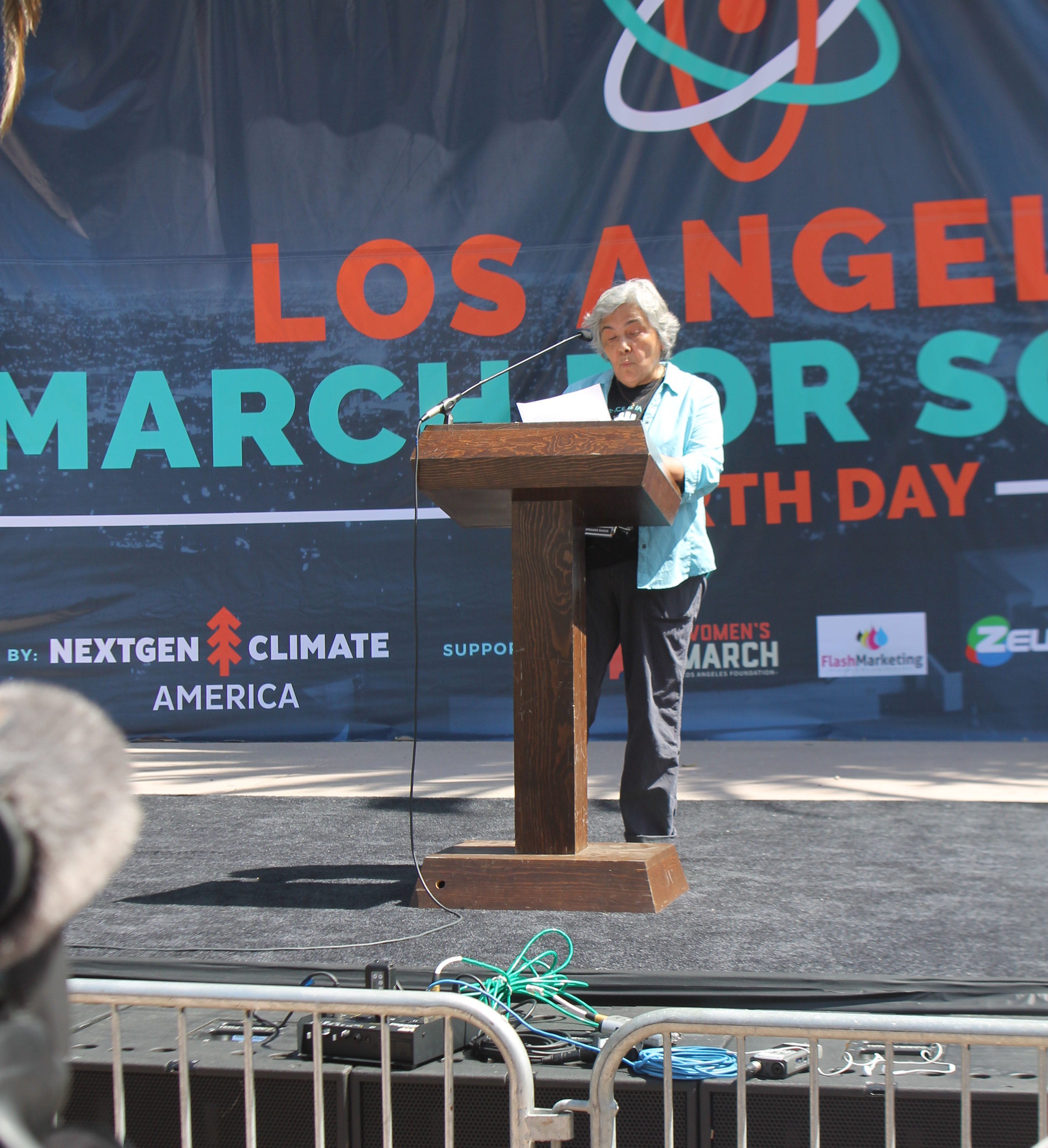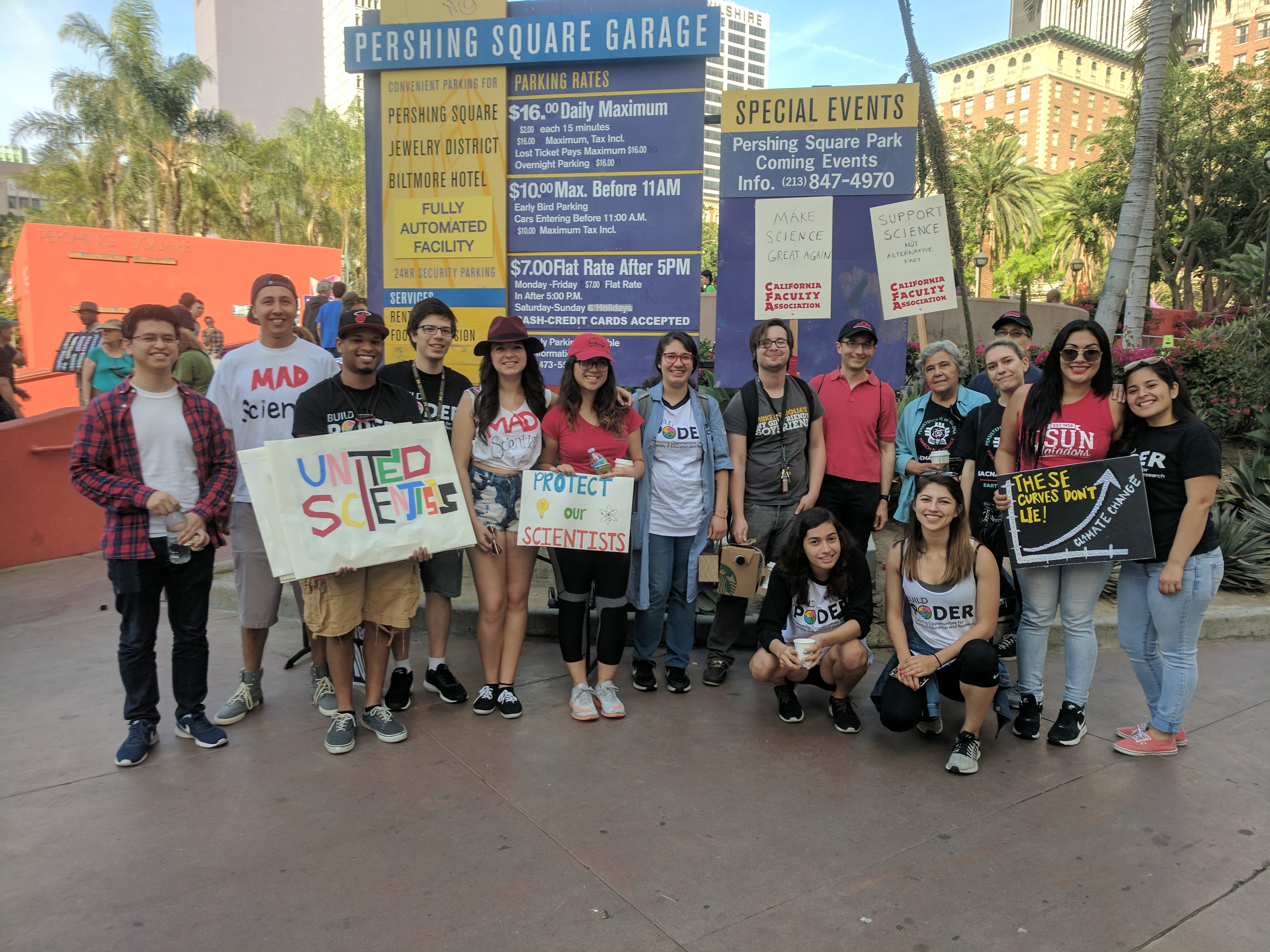(NORTHRIDGE, Calif., April 26, 2017) — Students from California State University, Northridge’s undergraduate research training program BUILD PODER participated in the first ever national March for Science on April 22, 2017 at Pershing Square in Downtown Los Angeles.
The march began at 9 a.m. at Pershing Square with several key speakers including celebrity scientist Lucy Jones, congressional representative Brad Sherman (D-Sherman Oaks), Hidden Figures author Allison Schroeder and CSUN biology professor MariaElena Zavala.

March for Science on April 22, 2017.
The March for Science was spurred in part by the Trump administration’s proposed federal budget, which would cut funding for public arts and science by 20 percent. The National Institutes of Health—which funds BUILD PODER and nine other BUILD programs at universities across the nation—would be heavily affected by this cut, threatening the progress of research crucial to curing diseases and creating scientific innovations. BUILD stands for Building Infrastructure Leading to Diversity and aims to increase the number of underrepresented groups in the biomedical research field by providing paid research training, mentorship and funding to diverse undergraduate students. BUILD PODER (Promoting Opportunities for Diversity in Education and Research), the largest grant-funded program in CSUN’s history at $22 million, focuses on health and health disparities, bringing a social justice aspect to research.
BUILD PODER student and graduating senior and biology major Calvin Apodaca said he chose to march because he sees a dangerous and unprecedented threat to scientific discovery in today’s political climate, but was inspired by the growing activism within the scientific community and wanted to participate in the equally unprecedented scientific social movement.
“Growing up, I learned about the Montgomery bus boycotts, the civil rights marches, protests and sit-ins, during tumultuous times,” Apodaca said. “Today I see scary parallels to those times. I see a period of high stakes change and I knew this was my time to act and put my money where my mouth is and let my political views be heard.”
As funding for science has been in slow decline over the last decade, Apodaca said a sudden large cut to the NIH would affect many other students he knows whose lives have been changed by the financial assistance that programs like BUILD provide, making reaching their goals and dreams much harder.
“I've had classmates who are homeless and living in their cars, going days without showering and hoping no one would notice,” Apodaca said. “I know students who are eating out of the food pantry at school because they can’t afford to buy food. Unsurprisingly, many of these students are minorities—without programs like BUILD, institutional barriers are going to continue limiting the success of many underrepresented students and potentially hinder innovations and solutions to problems that we might come up with. Our Ph.D’s and master's degrees, and our very careers, are on the line.”
Roxxette Zepeda, also a BUILD PODER student and a graduating senior majoring in public health has recently been accepted into the graduate nursing program at the University of California, Los Angeles with a plan to earn her Ph.D after she gets her nursing degree. Zepeda, who is Mexican, said she went to the march because cutting programs like BUILD would mean the efforts toward increasing minorities in the biomedical research fields would come to a halt, keeping students like her out of certain professions dominated by white or upper class students.
“As it is, nurses are not really supported to do research or get a doctorate—the support is even less existent for minorities,” said Zepeda, who wants to be a NICU nurse-researcher. “I am one of maybe a handful of Latina students in the incoming cohort in the UCLA nursing program. Even the crowd at the March for Science was predominately white. Programs like BUILD are just starting to change that, and we need these programs to support the next generation of diverse scientists.”
Other CSUN organizations such as Students for Science, Women in Science and Engineering (WISE), Maximizing Access to Research Careers and Research Initiative for Scientific Enhancement (MARC/RISE) and the CSUN Institute for Sustainability, as well as dozens of science students and science faculty such as professors Paula Schiffman, Tim Karels, Sean Murray, and Julian Lozos from Geology, were present.
CSUN professor MariaElena Zavala, who is not a BUILD faculty member but serves as the director of the NIH-funded MARC Undergrad Science Training and Academic Research (MARC U-STAR) program, spoke at the march, addressing diversity in science. Zavala is the first Mexican-American woman in the country to receive a Ph.D in Botany and the first Latina fellow of the American Society of Plant Biologists.

March for Science Los Angeles
"While plants are really important to me, I have to admit I have another passion and that is making science, education and discovery a path that is open to all,” Zavala said to the cheering crowd at Pershing Square. “Humanity is facing many serious challenges and I believe we can find the best solutions to these challenges by preparing the next generation of scientists and by making them as diverse as the population in this country. We can’t “play” science and be successful in science if we only field half a team.”
For more pictures and videos of BUILD PODER students at the March for Science Los Angeles, visit the BUILD PODER Flickr.

